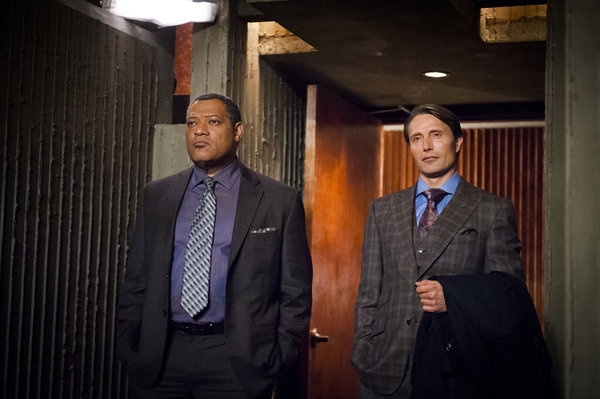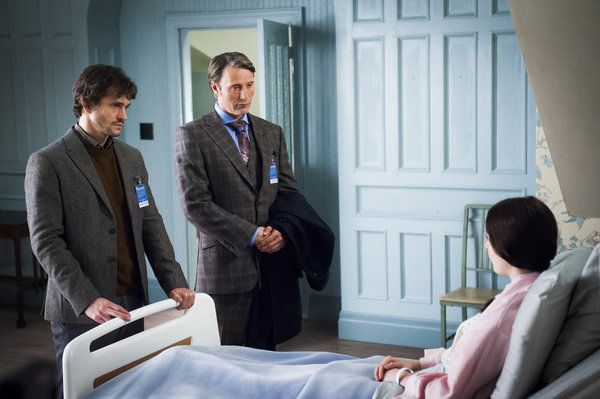
Courtesy of NBC
We’re not quite done with the Hobbs family saga as Hannibal returns to the events of the pilot to explore the nature of murder. And someone learns Dr. Lecter’s (Mads Mikkelson) secret.
Let’s bitch it out…
‘Potage’ proves to be the series’ most introspective and psychological hour yet as Hannibal devotes time to explore the impact on the victims and families of serial killers. This is also the first hour that more or less abandons the case of the week format as the entire hour is dedicated to exploring how Abigail Hobbs (Kacey Rohl) exists in a world in which she is now synonymously (at best) associated with her father, Garret Jacob Hobbs’ (Vladimir Cubrt) handiwork.
The associations are made early in the cold open as Abigail dreams of shooting and gutting a stag with her father. There’s no indication that this is a dream until Abigail substitutes the body of the animal for a screaming girl so until then it plays out like a flashback. It’s incredibly effective at demonstrating the uneasy relationship between father and daughter: Abigail follows her father’s instructions even as she subtly demonstrates her discomfort, first by missing the shot, then hesitantly helping to pull the stag off the car hood, and then again before sticking the knife in. The moment that Garret grabs her by the arm, coating her in blood, is clear foreshadowing of the events to come: not only the public perception of her guilt (visually rendered by the ‘CANNIBALS’ graffiti scrawled on her house), but in her final actions against Nicholas Boyle, the brother of the copycat victim.
The drama involving the copycat murder is strangely ineffective to me. I appreciate the coy attempt to establish an overarching mythology as Hannibal sets the stage for an inevitable Lecter vs Will (Hugh Dancy) showdown. Will’s lecture early in the episode provides more marvelous staging – it’s as though he’s speaking directly to Lecter and Laurence Fisburne’s Jack Crawford, even though Will’s actually addressing the FBI crowd. The issue with the copycat murders is that it feels like an attempt at black humour. I can appreciate that it may be an attempt to diffuse the somber tone of a show that drips with morbid intensity, but the cut-aways to Lecter’s bemused smile feel a little too on the nose. I half expect Mikkelson to break the fourth wall and wink.
Interestingly, I expected to feel more annoyed by the obviousness of Abigail’s murder of Nicholas (can we agree that it was murder and not self defense?). It’s clear as soon as Freddie (Lara Jean Chorostecki) interviews him that he’ll turn up to antagonize Abigail and that she’ll put him in the ground. As a result, the entire storyline is saved only because of the interplay between the girl and Lecter. The final scene, when she confronts him in his library, armed with the knowledge of his true nature (and role in her father’s actions) is intriguing enough to justify the murder and cover-up, especially if it means Abigail will return. It seems to me that Abigail isn’t complacent in her father’s crimes, but she’s not entirely innocent either. And that makes her interesting, especially now that she knows what Lecter really is.

Courtesy of NBC
Other Observations:
- Potage, if you’re a food luddite like me, is a “category of thick soups, stews or porridges.” In this case, you could say that the truth about Abigail’s involvement in the murders and whether she’s lying is unclear and murky like potage
- Did anyone else notice how similar Larissa, the neighbour, looks to Abigail when she first shows up? My immediate reaction = oh, well she’s dead. Lo and behold!
- The moment Abigail strokes the pillow, and then pulls out the clump of hair is totally gagworthy. The clear suggestion is that there are pieces of those eight girls scattered throughout her entire house. Barf
- How uncomfortable is the moment when Abigail asks Will, Alana (Caroline Dhavernas) and Lecter to role-play their way through her family’s murder re-enactment? This is not winning you any checks on the sanity meter, sweetie (though it unnerves and likely endears her to Lecter, as a result)
- As much as Lecter and Abigail are linked by their role in covering up Nicholas’ death, visually it is Will and Abigail who are visually matched through their violent, blood-soaked nightmares (in which they both play the role of aggressor). While Abigail doesn’t seem overly burdened by hers, Will is clearly beginning to unravel. I particularly liked the symbolism of Will walking through his darkened hotel room to rip open the curtains to let in the light
- So Alana doesn’t “do well” redeeming gift cards. What does that say about her?
- Would anyone contend that Freddie Lounds is by far the worst character on the show? She’s just a cypher: she turns up to stir the pot, then runs away. How did she even get into the hospital or past the police barrier? This character could be used in a much more effective way without lowering the quality of the show
- They only outline bodies in chalk or tape if you’re still alive before they finish the crime scene. The more you know!
- Finally, Will likens the experience of putting himself in the killer’s place to “shadows suspended on dust.” I love this show, but at times Will’s metaphors are just a wee bit contrived. Can we ease off on the purple prose?
Best Lines:
- Alana (when Abigail asks if she’s a doctor): “Not medicine. I’m a psychiatrist.” That’s one way of putting it
How did an episode without a case of the week work for you? Were you invested in Abigail’s drama, or were you bored? Do you think the shout-outs to the copycat murders and Lecter’s looks are black humour meant to diffuse its somber tone? And do we have a better sense of Alana now that she’s had more screen time? Comment away below
Hannibal airs Thursdays at 10pm EST on NBC
If you are a psychiatrist then you have a M.D. which means you are a Doctor of Medicine… LOL